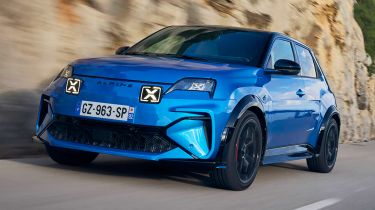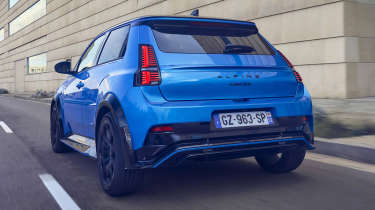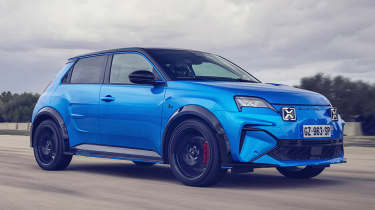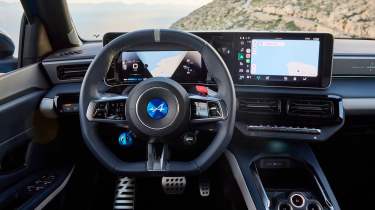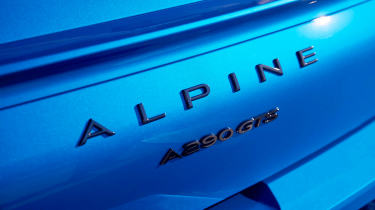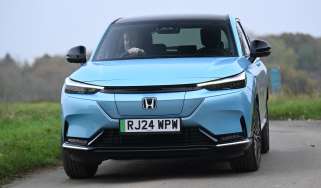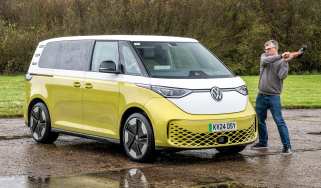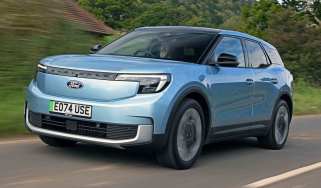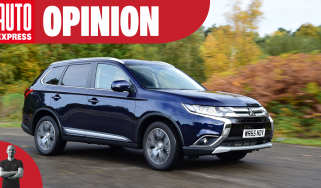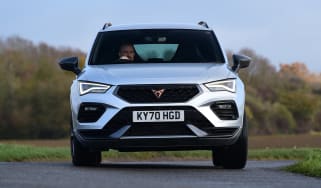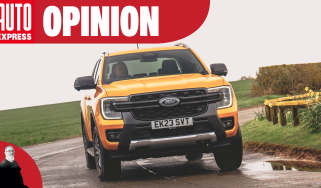Alpine A290 review
The new Alpine A290 all-electric hot hatchback is a rounded, well priced and very funky new model that’s got desirability in spades

Is the Alpine A290 a good car?
The new Alpine A290 isn’t as specialised or engaging to drive as the brilliant A110 sports car, but it’s still a stylish fast hatchback with good driving dynamics and just enough performance to fulfil its sporty mantra. While we feel there might be even more to extract from the chassis, it still adds up to an impressive all-round package built upon the solid foundations of the more sensible Renault 5.
| Key specs | |
| Fuel type | Electric |
| Body style | Supermini |
| Powertrain(s) | 1x e-motor, 52kWh battery |
| Safety | N/A |
| Warranty | 10yrs/100,000 miles |
How much does the Alpine A290 cost?
The A290 is the tricky second album in various aspects for both Alpine and its parent company, Renault. As the second model in Alpine’s modern era, it complements the A110 sports car in the range as the brand pivots to appeal to more customers in different and arguably more mainstream segments. But it’s also the first high-performance derivative of Renault’s hotly anticipated 5, with a more powerful front-mounted electric motor and an extroverted design.
In both cases, the A290’s key deliverable is driver engagement, and before you argue that it seems like little more than a hotted-up R5, do remember there’s historical precedent in Alpine getting its fingers on a contemporary Renault supermini. The A290 range in the UK will be split into three, with an entry-level GT and GT Premium making do with a 178bhp motor. At the top of the range is the GTS, packing a more powerful 216bhp power output, and Alpine will be bringing over a few limited-run Premiere Editions for good measure.
More reviews
In-depth reviews
Pricing in the UK has yet to be officially set, but should start at around £33,500 for the base car, rising to £38,000 for the GTS, with the GT Premium sitting somewhere between. Premiere cars will likely carry a further £1,000 surplus over GTS for the few hundred coming to the UK.
Engines, performance & drive
| Model | Power | 0-62mph | Top speed |
| Alpine A290 GT | 178bhp | 7.4 seconds | NA |
| Alpine A290 GTS | 216bhp | 6.4 seconds | NA |
The most notable difference between the A290 and a Renault 5 is the electric motor, which isn’t just more powerful – with between 178bhp and 216bhp – but also slightly larger. By extension this also means the Alpine has a unique front subframe and completely new suspension geometry on axles that are 60mm wider.
It also picks up the clever hydraulic bump stops that were introduced on the last-generation RenaultSport Megane – something we think would be quite a useful addition to a high-performance electric car.
So does the A290 actually feel different to the Renault 5? The short answer is a solid yes, because even if you were to ignore the extra power, there’s a tangible difference between the two that largely centres around the steering. Not only is the Alpine’s rack a little bit faster than the Renault’s, it also feels much more precise just off-centre and has a little more resistance. That’s not to say it’s chock-full of feel, but it’s definitely more engaging.
The A290 is also very well damped, which is important, given that the basic ride is quite firm, although never crashy. While the smooth Mallorcan roads on our test didn’t put up too much of a challenge for most of our drive, smaller roads with more aggressive lumps and bumps were shaken off very effectively. At higher speeds, the A290 has no problem handling its weight which, despite being an EV, sits at an impressively lithe 1,479kg.
When you do put your foot down, performance is pretty much as you’d expect of something with 218bhp and a near 1.5-tonne kerbweight. Despite the car’s focus on performance, there’s not much snap to the acceleration; instead it has more of a forceful surge. For maximum performance, there’s an additional OV or overboost function activated from a BMW M-style button on the steering wheel, but it still doesn’t make the A290 anything more than brisk.
There are four driver modes – Save, Comfort, Sport and Personal – and these change the e-motor’s mapping and outputs, as well as the steering weight and the virtual engine noise. The final control on the steering wheel is a little blue toggle, which controls the regenerative braking; this has four settings, from a near one-pedal driving mode at one end to a full-coast mode at the other.
Floor the throttle in Sport mode and there’s a small amount of torque steer to remind you this is a front-wheel-drive car, and thanks to the instant torque of the e-motor you can find yourself needing to manage front-end traction out of tighter corners. There’s no mechanical limited-slip differential – Alpine says a virtual differential using the brakes is more effective – but it certainly helps liven up things from the driver’s seat.
The brake pedal itself is nicely consistent and has good feel, which is especially important on something purporting to be a hot hatchback. The braking power itself is also good, easily withstanding some heavy stops on a short track session.
We would like to sit a little lower in the cabin, but the under-floor battery cells make this difficult to achieve, and while there’s good adjustment to the seating position, some still might find the view out a little restricted due to the shallow windscreen.
Range, charging & running costs
| Model | Battery size | Range | Insurance group |
| Alpine A290 GT | 52kWh | 235 miles | N/A |
| Alpine A290 GTS | 52kWh | 236 miles | N/A |
All A290s have the 52kWh battery pack that’s also found in the Renault 5. This delivers a range of around 235 miles on both the GT and GTS, which is around 20 miles less than the best in the R5 line-up. The charging rate is about par for the course in this class at 100kW, which will top up the battery from 15-80 per cent in around 30 minutes.
Running costs will be a touch higher than similarly sized EVs, on account of the high-spec Michelin Pilot Sport S5 rubber, and the e-motors’ tenedency to get them spinning under hard acceleration.
Design, interior & technology
The Alpine’s design is based on the Renault 5’s, but benefits from more complex detailing and arguably more sophistication. The exterior is definitely less retro than the R5, and has more complex elements front and rear, including a set of rally-inspired running lights and a unique rear door impression that references the original Renault 5 Turbo.
Inside, the Alpine’s basic dash layout is also shared with the Renault, but in place of retro touches like the vertical stitching on the passenger side are more contemporary faux-leather materials in blues and silvers. The seats are also common to both Alpine and Renault, which is no bad thing because they’re brilliantly supportive and comfortable at the same time.
What is new in the A290 is the centre console, which is a decidedly mixed bag. On the high-mounted console you’ll find a simple three-button gear selector, which replaces the thin wand you’ll find on the column of an R5. This is excellent news because it frees up some space behind the steering wheel – a particular gripe of the Renault – but it means there’s no longer any cup-holder. This also has the effect of reducing the size of the centre cubby, and while there is still a wireless phone charger, there’s nowhere to put other small items like keys or wallets.
Overall quality is very good, though, with an intelligent spread of soft-touch materials where you see and touch them, and more resilient hardwearing plastics where you don’t. The dashboard itself does sit quite high, though, and can be a challenge to peer over unless you raise the seat.
Sat-nav, stereo and infotainment
Alpine’s digital interfaces are also based on the same Google backbone as in the Renault 5, making the system super-quick to respond, and easy to navigate and personalise. In front of the driver sits a 10.25-inch display with some quite elaborate graphics and plenty of variability in its layout. It can be a little trickier to read than its Renault counterpart, but does suit the Alpine’s sportier image.
The 10.1-inch main touchscreen features built-in Google Maps and other Google services without needing to connect to your phone – although if you do, Android Auto and Apple CarPlay are both wireless. GT Premium and GTS models also have an upgraded stereo system that performs well above the expected level for a car of this size and price.
Boot space, comfort & practicality
| Dimensions | |
| Length | 3,990mm |
| Width | 1,820mm |
| Height | 1,520mm |
| Number of seats | Five |
| Boot space | 326 litres |
Where the Alpine A290 falters inside is rear-seat space, because although it has more doors than an electric MINI, there’s not much extra space back there. In essence, compared with a traditional supermini such as the Corsa-e or Peugeot E-208, it’s tight, both in terms of legroom and foot space. The flat floor does help the latter in some respect, but the car’s relatively narrow body will make sitting three-abreast back there troublesome.
The compromise has been largely to the benefit of boot space, however, because the 326-litre capacity is fairly impressive. The rear seats do fold, but there’s no false floor or clever mechanisms to tidily store the charge cable. There’s also no space under the front bonnet. As mentioned above, there are no cup-holders in the front, and the door bins are only just about big enough for a small bottle of water – there’s nowhere at all for reusable or insulated water bottles.
Safety & reliability
| Key standard safety features | Euro NCAP safety ratings |
|
|
Both the Renault 5 and Alpine A290 have yet to be tested by Euro NCAP, but Renault’s historic emphasis on safety should see the cars earn a good star rating. They also feature the latest active safety features, and best of all, the ones you don’t want switched on can be disengaged quickly and easily via a small physical button to the side of the steering wheel.
Alpine A290 alternatives
Electric hot hatchbacks have long felt like the holy grail for mainstream manufacturers, and it’s a marketplace that’s now pretty chock full of options – both expected and unexpected. The key competitor for the Alpine is the MINI Cooper S E, and the similarly-sized and powered 52kWh model costs around the same as its French rival. The MINI does offer some of the brand’s go kart-like handling, but doesn’t feel as sharp as the Alpine. There’s a full John Cooper Works model coming next year, and this will likely prove to be the A290’s toughest competitor from a mainstream brand.
Beyond this, the smaller and much less powerful Abarth 500e is only slightly cheaper, so doesn’t quite stack up with this new competition. However, the slightly larger 600e, and even more interestingly the new Alfa Romeo Junior Veloce, offer some compelling new options, although at an admittedly higher price tag.
Look away from the old-fashioned rivals, and cars like the Volvo EX30 Dual Motor, Brabus Smart #1 and MG4 XPower all offer considerably more performance for considerably less money. However, none are really the product of an immersive engineering program, and instead their power and performance are almost incidental. An MG4 XPower flat-out is a hair-raising experience.
Frequently Asked Questions
Alpine provides a three-year warranty on all its electric cars, with unlimited mileage over the first two years, and then up to 100,000 miles for the remaining third year, depending on which comes first.

